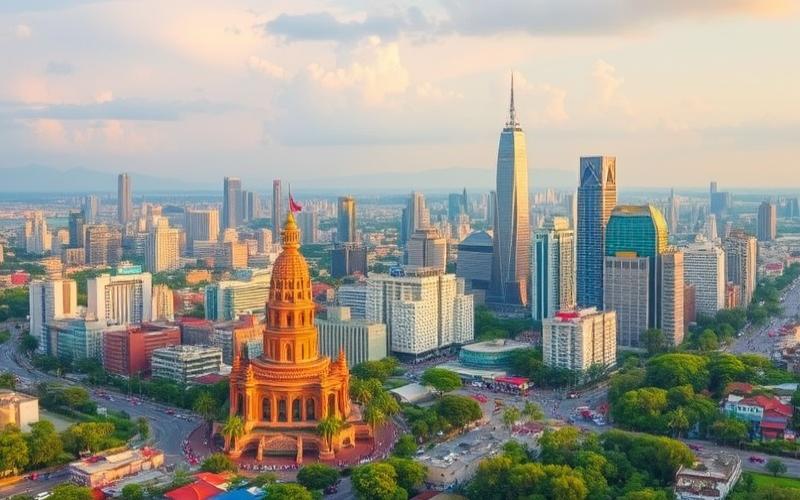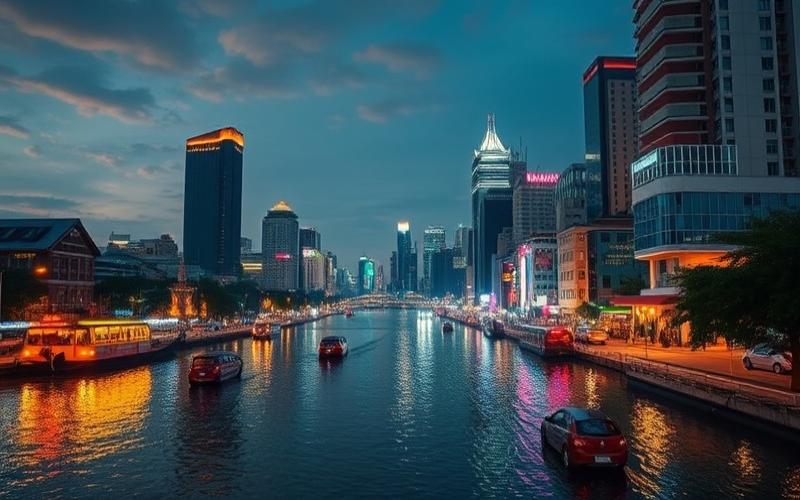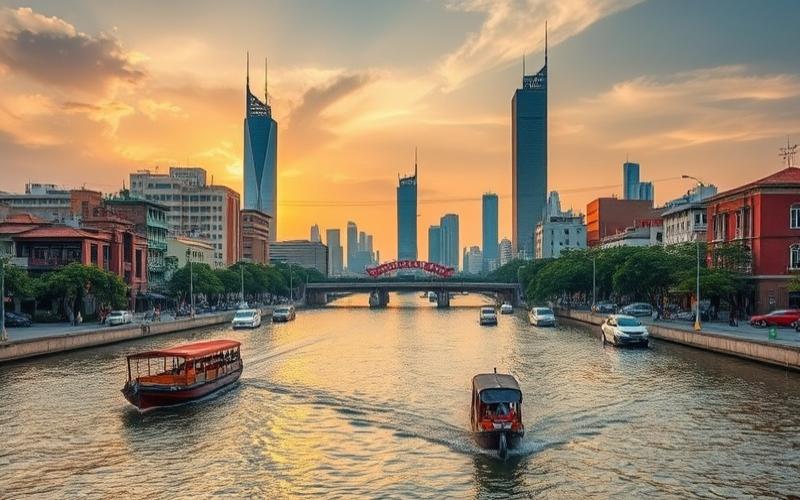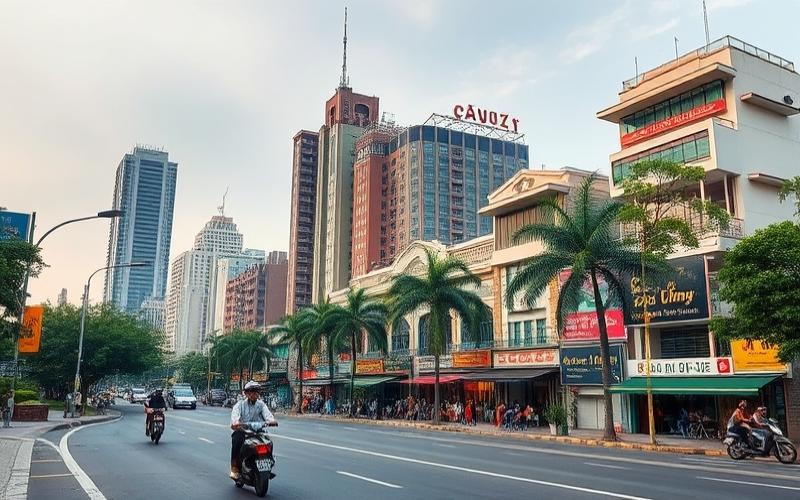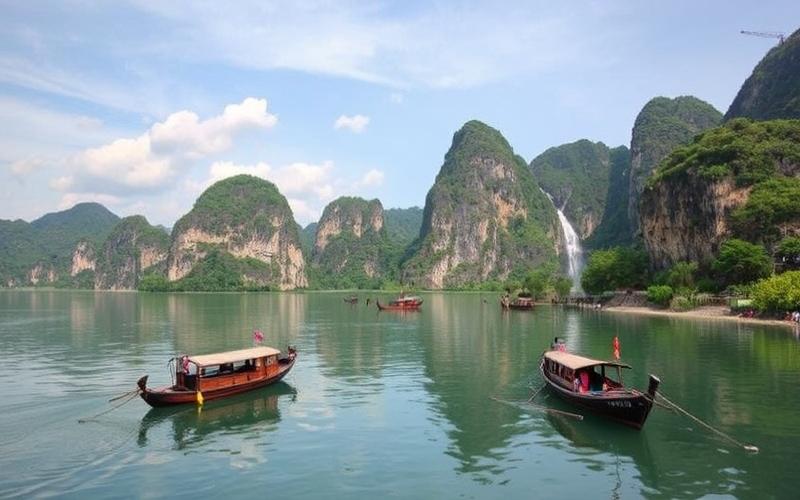
 Published on and written by Cyril Jarnias
Published on and written by Cyril Jarnias
Rental Investment in Vietnam: Airbnb vs Long-Term Rental
In an ever-evolving real estate market, the question of rental investment in Vietnam is attracting growing interest from owners and investors seeking to maximize their returns. While short-term rental platforms like Airbnb appeal with their promise of high income and flexibility, long-term rental remains a stable and secure option.
This article examines the comparative profitability of these two models across key Vietnamese cities, exploring the economic and social factors that influence owners’ decisions. It provides an informed perspective on how current and future trends could impact investment choices in this rapidly expanding country.
Good to Know:
Vietnam has experienced sustained economic growth for several years, making it an attractive market for real estate investors.
Analysis of Short-Term Rental Yield in Vietnam
Comparative Table of Airbnb vs. Long-Term Rental Profitability in Major Vietnamese Cities
| City | Airbnb Occupancy Rate | Average Monthly Airbnb Income | Estimated Monthly Long-Term Rent | Main Airbnb Costs* | Main Long-Term Costs* |
|---|---|---|---|---|---|
| Ho Chi Minh City | 51% | 16,400,000 VND (~$650) | 10–15 M VND ($400–600) | Maintenance, cleaning, platform fees (15-20%), furniture, tenant turnover | Basic maintenance, potential unpaid rent |
| Hanoi | 42% | 11,500,000 VND (~$455) | 7–12 M VND ($280–480) | Same as HCMC | Same as HCMC |
| Da Nang | approx. 45% | ~9–10 M VND (~$380–420)** | ~6–8 M VND ($240–320)** | Same as major cities | Same as major cities |
| Hoi An | approx. 38-42%*** | ~7-8 M VND (~$280-320)** | ~5-7M VND ($200-280)** | Very distinct high/low season |
* Income and rent figures are current market averages for a standard 2-bedroom/3-bedroom apartment in the city center.
** Estimates based on market trends and local platforms.
*** Lower occupancy outside peak tourist season.
List of Main Advantages and Disadvantages
Airbnb / Short-Term Rental:
Advantages:
- Potentially higher income during tourist peaks or high season.
- Flexibility for personal use between rentals.
- Ability to adjust prices based on demand and local events.
Disadvantages:
- More intensive management: frequent guest reception, recurring cleaning with each turnover.
- Dependence on local tourist traffic: possible sharp decline off-season or during international health/economic crises.
- Significant fees: platform commission (up to 20%), increased maintenance of property/furniture/replacement of damaged equipment.
Long-Term Rental:
Advantages:
- Financial stability with fixed monthly rent; simplified management via annual or semi-annual lease.
Disadvantages:
Overall yield often lower than Airbnb’s potential peak over the full year in dynamic urban tourist centers like Ho Chi Minh City during high season or major international events, but generally higher during low periods or prolonged crises.
Economic/Tourist/Seasonal Factors Impacting Short-Term Rental Yield
Summary List:
- Marked Seasonality
- December is often the most profitable month for Hanoi & Ho Chi Minh City thanks to international holidays & Vietnamese Lunar New Year; conversely June/July are generally less attractive outside European/Asian school holidays.
- International Tourism Evolution
- Continuous growth until the pandemic’s start then gradual recovery since mid/late 2023: notable increase in total active listings (+13,000 in Ho Chi Minh City by end June 2025).
- Competition Effect
- The more properties listed on Airbnb/similar local platforms, the less each owner can expect high occupancy rates without standing out through service/price/location.
- Legal Context
- To date, regulations are rather flexible regarding short-term rentals in these four main cities, but this remains subject to rapid change under pressure from hotel industry/local lobby.
Recent Owner Excerpts and Testimonials
“I opted for Airbnb because my apartment is located near the historic center; I double my income between October and January but have to personally manage all check-ins/check-outs” (owner in Hanoi)
“Long-term rental guarantees me less stress… even though I earn about 20% less than my friends renting solely through platforms” (expat owner in Da Nang)
“After three years on Airbnb in Ho Chi Minh City, I experienced several empty periods but December almost reimburses my entire annual investment!” (local owner)
In Summary
Short-term rentals via Airbnb offer higher gross profitability during strong tourist seasons or if the property is ideally located/catering to an active foreign clientele; however, they involve more daily management as well as significant volatility linked to global and local economic cycles and possible future regulation—while long-term rental provides reassurance through contractual stability but generally caps annual yields below those achievable periodically with well-managed short-term tourist accommodation in these dynamic Vietnamese metropolises.
Good to Know:
In Hanoi and Ho Chi Minh City, short-term rentals via Airbnb often show higher monthly revenues, with an average occupancy rate close to 70%, contrasting with long-term rentals that offer income stability but less flexibility. In Da Nang and Hoi An, the trend is similar, but success varies greatly depending on the tourist season, with low periods sometimes requiring price adjustments to maintain occupancy. Management costs, such as cleaning and maintenance, are higher for Airbnb, although owners report superior profit margins once costs are controlled. Local rental policies, tourism development, and economic fluctuations also impact profitability; a growing economic context generally favors temporary stays. Experience feedback highlights the importance of location and optimizing Airbnb listings to maximize yield, while long-term rentals appeal through their management simplicity and financial predictability.
Airbnb and Long-Term Rental Comparison by City
Real Estate Market Characteristics by City
| City | Main Characteristics |
|---|---|
| Hanoi | Administrative capital, strong rental demand, dynamic market for expats and locals. Significant supply of modern urban apartments. Relatively flexible legislation on short-term rentals. |
| Ho Chi Minh City | Major economic center, high international appeal, strong competition among real estate investors. Central neighborhoods preferred for Airbnb and premium rentals. |
| Da Nang | Coastal city with booming tourism, attracting families and international travelers; rapid development of vacation residences near beaches. Pronounced seasonal market. |
| Nha Trang | Popular beach destination with concentration of tourist buildings near waterfront; market dominated by foreign clientele (Russian/Chinese). Strong summer seasonality and evolving regulations on short-term. |
| Sa Pa | Small mountain town with high tourist influx during peak seasons (summer/autumn), limited but highly sought-after atypical accommodation (traditional houses/homestays). More restricted market but high margins in high season. |
Potential Earnings Comparison: Airbnb vs Long-Term Rental
| City | Average Annual Airbnb Revenue* | Estimated Annual Long-Term Rental Revenue | Typical Airbnb/Long-Term Ratio |
|---|---|---|---|
| Hanoi | ~138M VND (~$5,000) | ~$2,700–3,200 | 1.5 to 2 |
| Ho Chi Minh City | ~160M VND (~$6,300)** | ~$3,500–4,000 | 1.5 to 2 |
| Da Nang | ~152M VND (~$6,000)** | ~$3,500–4,200 | 1.5 |
| Nha Trang | ~168M VND (~$6,600)** | ~$3,800–4,500 | >1.5 |
| Sa Pa | Variable: up to $7,000 depending on occupancy rate*** | ~$2,400–3,000, stable yield | >2 |
*Figure sources from aggregated data between June 2024-May 2025.
**Estimation based on comparable trends in major tourist cities.
***Extreme seasonality: revenues doubled or tripled during summer/autumn.
Seasonal Occupancy Variation & Profitability Impact
- Coastal markets like Da Nang and Nha Trang show much higher occupancy during peak tourist season (May-September), potentially exceeding +60%, while sometimes dropping below 30% off-season.
- In Hanoi or Ho Chi Minh City, occupancy is more regular thanks to business tourism and expats but still subject to a peak in December/January (up to +50%).
- In Sa Pa: high volatility – properties full during festivals/dry seasons (>70%), almost empty off-season.
An annual occupancy rate above approximately 40-45% is necessary to surpass the net profitability of a long-term lease.
Associated Additional Costs
- Short-Term Rental / Airbnb
- Platform fees (10–18% of revenue)
- Professional maintenance/cleaning (~$500-$1500/year)
- Increased maintenance
- Possible specific local taxes
- Optional rental management (+10% additional)
- Long-Term Rental
- Fewer recurring fees
- Minimal regular maintenance
- Often simplified taxation
- Limited risk related to turnover
Typical Owner & Potential Tenant Profiles
Comparative list:
Owners:
- Short-term rental: investors seeking maximum yield/capital reactivity; young digital entrepreneurs; expats owning multiple residential properties.
- Long-term rental: Vietnamese families wanting to secure stable passive income; retirees living far from the rented property.
Tenants:
- Short-term rental/Airbnb: foreign/domestic tourists staying <1 month; digital nomads; business travelers.
- Long-term rental: local professionals/students; expats on long assignments (>12 months); local families without immediate access to property purchase.
| City | Airbnb Advantages | Airbnb Disadvantages | Long-Term Advantages | Long-Term Disadvantages |
|---|---|---|---|---|
| Hanoi | – Higher profitability – Strong suburban demand – Currently permissive regulation | – Marked low season – High fixed costs if low occupancy | – Income stability – Little active management required | – Capped yield – Low rent indexing |
| Ho Chi Minh City | High peaks during business/international events, Large rental pool, Possible diversification central/peripheral neighborhoods | City center saturation, Possible new regulations, Dependence on international flow | Tax simplicity, Reliable local target Frequent subletting accepted | Stagnant rents outside center, Moderate default risk among newcomers. |
| Da Nang/Nha Trang | Very profitable summer peaks, Diverse international clientele, Added value “beach” services (pool/wifi) | Extreme seasonality, Complex logistics management, Dependence on foreign platforms. | Low months compensable by long contracts | Lower gross margin than short-term, Difficult rotation off-season. |
| Sa Pa | Exceptionally high nightly rates during festivals/dry seasons. Rare supply = high price. Valued authentic experience. | Uncertain annual occupancy. Increased maintenance due to weather conditions. | Zero management between seasons. Regular income even low attendance. | Low annual average ticket. Difficulty finding long-term tenant locally. |
Good to Know:
In Hanoi, the real estate market is dynamic with stable demand for both rental types; Airbnb offers potentially higher monthly revenues, but occupancy rates vary greatly depending on seasons, explaining fluctuating profitability. In Ho Chi Minh City, long-term rental is favored due to growing economy and strong expat demand, although Airbnb is profitable during peak tourist season. Da Nang attracts with its beaches, favoring Airbnb, but management fees and taxes can be high; during low periods, long-term rental is more stable. Nha Trang depends largely on tourism, with strong potential for Airbnb, even if off-season occupancy rates drop. In Sa Pa, Airbnb potential is moderate, especially during mountain tourism periods, while long-term rental is rare but stable. Airbnb owners face higher management fees and specific regulatory requirements, while long-term owners benefit from more predictable income flow. Young entrepreneurs prefer Airbnb for its flexibility, while families opt for long-term rental stability. Each city presents a choice based on specific market characteristics and needs of potential owners and tenants.
Factors Influencing Rental Contract Profitability in Vietnam
Analysis of Key Profitability Factors for Rental Contracts in Vietnam: Airbnb vs. Long-Term Rental
| Factor | Airbnb (Short-Term Rental) | Long-Term Rental |
|---|---|---|
| Seasonality | Fluctuating occupancy rates: peak in December in Hanoi; strong seasonality observed, with average annual occupancy of 42% in Hanoi and 36% in Ho Chi Minh City. Monthly revenues can vary from VND9.4M (low season) to VND15.7M (high season). | Stable occupancy rate year-round, low sensitivity to seasonal variations. Regular revenues without marked peaks or troughs. |
| Location / Demand | Strong concentration in major cities: Ho Chi Minh City (13,920 listings), Hanoi (8,273), Da Nang… Yield heavily depends on local tourist dynamism and city ranking among attractive markets for Airbnb. | Demand is sustained in economic and university capitals like Hanoi or Ho Chi Minh City, but less volatile than short-term market; appeal for residential neighborhoods near business centers or university campuses. |
| Real Estate Market Price | Higher rental yield possible if acquisition made before real estate boom; however, increased volatility as value also depends on tourist fluctuations and growing competition among Airbnb hosts in some central neighborhoods. | More stable yield but generally lower than short-term; depends more on overall local residential real estate market evolution than occasional tourist flow. |
| Operational Costs | Higher: frequent maintenance, cleaning between each stay (~VND200k-400k per turnover), reservation management/guest reception/departure; platform fees (~3%). Auxiliary services often needed: linen/hygiene/included internet/coffee/snacks… | Costs limited essentially to annual/preventive maintenance; generally no legal obligation/direct billing for additional services beyond standard charges (water/electricity/internet sometimes billed separately). |
| Local Regulation | Rather permissive regulation in 2025 in the three main studied Vietnamese cities (“lenient”) but evolving risk as some municipalities consider increased oversight facing rapid short-term rental development; sometimes need for specific registration with local/tourist authorities depending on concerned urban areas. | Traditional stable regulatory framework with classic landlord-tenant protection according to Vietnamese civil code; rarely subject to sudden regulatory changes except major national reforms very rare in this segment. |
| Traveler/Tenant Preferences | Travelers seek maximum flexibility (short/modifiable stays) and personalized local experiences via digital platform – trend reinforced post-COVID-19 particularly among digital nomads/temporary expats. | Tenants value contractual stability over several months or even years as well as superior budget predictability – mainly families/local professionals or long-term expats, international students… |
Comparative data by city:
HANOI
- Average annual Airbnb revenue: VND138M (~$5,000 USD)
- Average annual occupancy: 42%
- Average monthly short-term rental revenue: ~VND11.5M
- Average monthly long-term rent for furnished downtown apartment*: ~VND10–13M
(*varies by neighborhood/type)
HO CHI MINH CITY
- Estimated average annual Airbnb revenue top hosts: up to $5146/year with average occupancy around 36%
- Typical ADR: $60/night
- Long-term rent downtown*: ~VND12–18M/month
DA NANG
Similar data but revenues often intermediate between Hanoi and Ho Chi Minh City thanks to strong summer beach appeal.
Summary list — structural advantages/disadvantages:
Main AIRBNB model advantages:
- Superior potential gross profitability during peak periods.
Disadvantages:
- Significant volatility linked to seasonality.
Main LONG-TERM RENTAL model advantages:
- Reassuring financial flow predictability.
Disadvantages:
- Gross profitability often lower outside exceptional periods.
Key Takeaway:
Optimal net profitability will depend mainly on:
- The exact location,
- The actual level of local tourist activity,
- Your operational/logistical capacity,
- Your risk tolerance facing potential regulatory variations.
It is crucial to finely analyze each targeted urban micro-market before any rental investment to rationally arbitrate between flexibility/high potential profitability offered by the short-term “Airbnb” type model versus stability/management simplicity characteristic of the traditional Vietnamese long-term contract.
Good to Know:
In Vietnam, rental contract profitability, whether Airbnb or long-term rental, is largely influenced by seasonal rhythm affecting occupancy rates; for example, Hanoi and Ho Chi Minh City experience tourist influx during holidays and vacations, thus boosting demand for short-term rentals. In Da Nang, a popular coastal city, summer high season drives up Airbnb prices, contrasting with more stable but less lucrative demand for long rentals. Real estate market fluctuations can impact yields, as can operational costs heightened by maintenance needs and services like regular cleaning in Airbnb. Regulatory issues add a complex layer, with more marked restrictions on short-term rentals, especially in large urban areas. Tenant preferences also evolve, with increased trend for short-stay flexibility. Thus, in Hanoi, a long-term rental apartment may generate an annual net yield 2 to 3% lower compared to a property rented on Airbnb, but with operational expenses estimated at 15% of its gross revenue, versus 30% for Airbnb management.
Recommendations for Real Estate Investors in Vietnam
Analysis of Key Profitability Factors for Real Estate Investments in Vietnam: Airbnb vs. Long-Term Rental
Main factors influencing profitability:
- Robust economic growth (rising GDP, increased purchasing power)
- Strong urban and tourist demand
- Evolving regulations (particularly on short-term accommodation)
- Favorable interest rates facilitating credit access
- Infrastructure development in major cities
Airbnb vs. long-term rental comparison:
| Criterion | Airbnb | Long-Term Rental |
|---|---|---|
| Cash Flow | Higher in high season, but irregular | Stable and predictable |
| Projected Occupancy Rate | Variable by city/season: 60–90% during tourist period | Generally >85% in major cities |
| Management Costs | High: frequent cleaning, concierge, marketing | Low to moderate: classic rental management |
| Associated Risks | Regulatory (legality of furnished short-term), more frequent vacancy, potential increased damage | Possible unpaid rent, low turnover but possible contractual rigidity |
Variations by city and local trends:
Ho Chi Minh City
- Economic capital; strong demand for both models.
- Airbnb performs well in downtown and lively neighborhoods.
- Long-term rental very stable thanks to professional influx.
Hanoi
- Dynamic residential market with rapid price appreciation.
- Growing tourist demand; good potential for Airbnb especially near Old Quarter.
Da Nang & Nha Trang
- Very attractive for international/domestic beach tourism.
- Marked seasonality: high yield for Airbnb during high season (national holidays/summer), occupancy rate dropping off-season.
Regulatory & Market Trends
Vietnamese authorities are gradually tightening regulations on short-term rentals to oversee the informal sector. It is therefore crucial to systematically verify legality before any investment dedicated to Airbnb.
Potential financial benefits via diversification:
Diversifying between these two models allows:
- Smoothing annual income despite seasonality or a temporary crisis (example: COVID).
- Arbitrating based on market evolution or local taxation.
- Optimizing real estate portfolio facing regulatory or economic hazards.
Practical tips to optimize management/profitability:
- Prioritize property located near major tourist spots/economic centers if objective is short-term/Airbnb.
- To maximize annual occupancy rate: opt for property easily convertible between furnished tourist and standard lease depending on local/seasonal conditions.
- Outsource certain tasks (cleaning, check-in/out) to specialized agencies if significant volume on Airbnb to gain operational efficiency while controlling fixed costs per rented unit.
Property types to prioritize based on seasonal/tourist influx:
Indicative list:
- Studios/2-bedroom near city center or beaches = rapid rotation + high tourist/short-stay attractiveness
- Family apartments (>70m²) suitable for expats/professionals = long-term lease stability
- Secure/managed residences with modern amenities = premium on rents/short and long rental
To maximize profitability in Vietnam, it is therefore advisable to:
- Rigorously select location,
- Remain attentive to regulatory developments,
- Adapt offering to each key period through flexible management,
- And finally, consider intelligent diversification between several rental modes to cushion risks and volatilities of the local real estate market.
Good to Know:
For real estate investors in Vietnam, it is essential to weigh Airbnb against long-term rental to optimize profitability; although Airbnb can offer larger cash flows thanks to high daily rates, it is subject to variable seasonal occupancy rates, particularly in Ho Chi Minh City and Hanoi. Furthermore, Da Nang and Nha Trang present strong tourist prospects, but require strict management due to visitor peaks. Long-term leases, while ensuring stable income and less daily management, can be impacted by changing local regulations. Diversifying properties between these two models, such as a villa for Airbnb and an apartment for long-term rental, can minimize financial risks. Maximizing profitability requires investing in properties in city centers or near tourist sites and staying informed of latest trends and regulations. Finally, adopting good management practices like using property management platforms can increase operational and financial efficiency.















